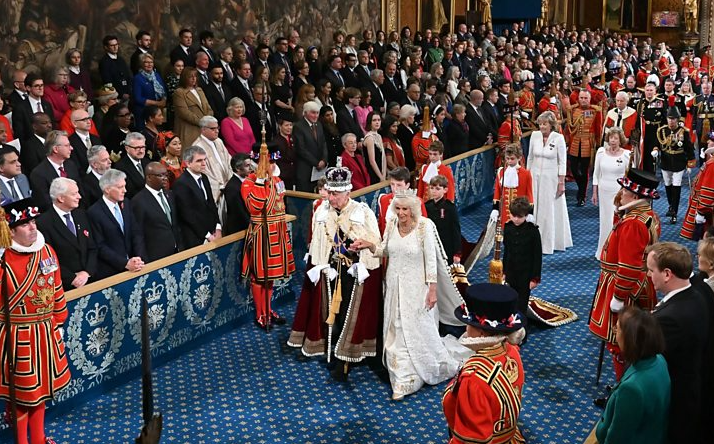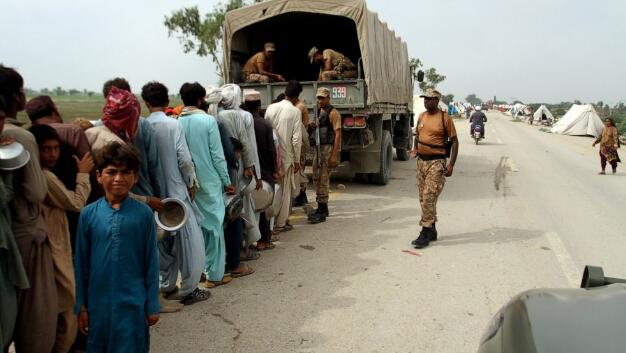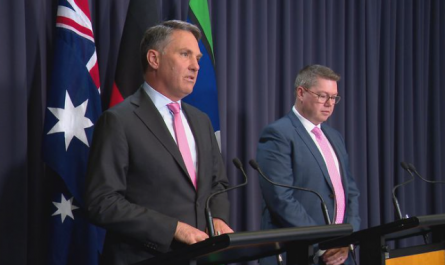Prime Minister Rishi Sunak has put law and order at the centre of the King’s Speech as he sets out his priorities ahead of the next general election.
Tougher sentences for the most serious criminals and measures to force offenders to appear in the dock are among those to feature in the government’s plans for the year.
Labour said the government had just repackaged previously announced ideas.
It was the first King’s Speech in more than 70 years, following the death of the Queen last year, and King Charles’s first as monarch, although he stood in for his mother in May 2022.
It was also Mr Sunak’s first as prime minister – and could be his last before the next general election, which is expected next year and must happen by the end of January 2025.
With the Conservatives lagging behind Labour in the polls, Mr Sunak is hoping to showcase key policies and draw dividing lines with the opposition to win over voters.
Although the speech is written by the government, it is delivered by the monarch in a neutral tone, to avoid any appearance of political support.
A phased ban on smoking, reform of the leasehold system and a bill to ensure licences for oil and gas projects in the North Sea are awarded annually were also among measures outlined.
But supporters of a ban on so-called conversion therapy to change someone’s sexual orientation or gender identity – which has been promised since 2018 – will be disappointed it is not included.
There is also no mention of a bill to ban the import of hunting trophies into Great Britain – a Conservative manifesto commitment at the last election.
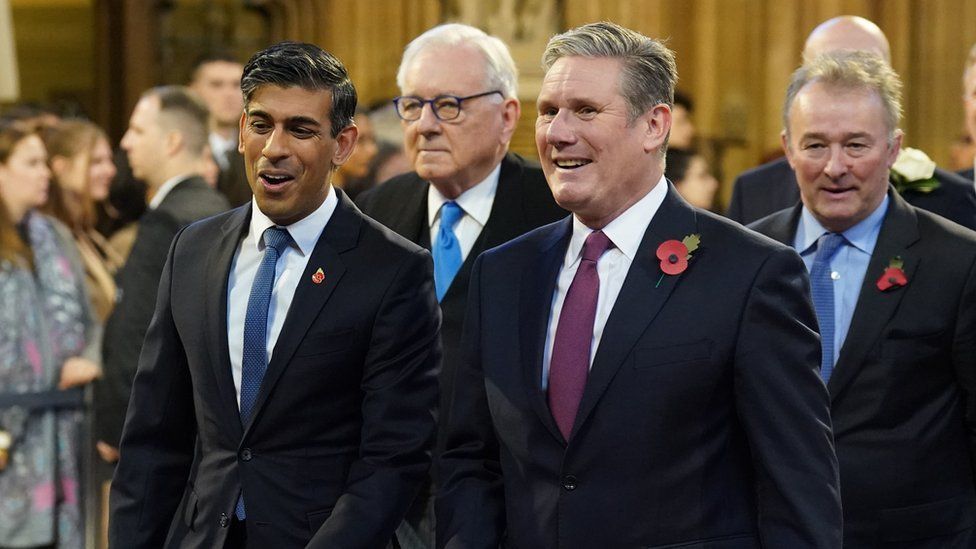
A key focus of the speech was keeping the public safe and improving justice for victims.
Plans include a bill, covering England and Wales, to implement past promises to ensure offenders who commit murders with sexual or sadistic motives will spend the rest of their lives in prison.
There would also be tougher sentences for grooming gang members and those who murder their partner at the end of a relationship.
But with many prisons overcrowded, there are plans for most sentences of less than 12 months to be suspended.
This would mean for less serious crimes, offenders can stay out of prison if they comply with requirements set by the court.
The Criminal Justice Bill will include measures to make clear “reasonable force” can be used to make criminals appear in the dock, with offenders who refuse given two extra years in prison.
Ministers announced plans for such a law earlier this year, following high-profile cases of offenders refusing to appear for their sentencing such as the baby killer Lucy Letby and Jordan McSweeney – who was convicted of murdering Zara Aleena.
The bill will also give police the power to enter a building without a warrant to seize stolen goods if they have reasonable proof that the item is inside the property – for example, by a stolen mobile phone which is broadcasting its position.
Other measures set out in the speech include:
- Establishing a regulator for the top five tiers of English professional football to “safeguard” the future of clubs for the benefit of communities and fans
- A new legal framework in Great Britain for self-driving cars
- New powers for Transport for London to regulate pedal-powered taxi cabs in the capital and “deal with the scourge of unlicensed pedicabs”
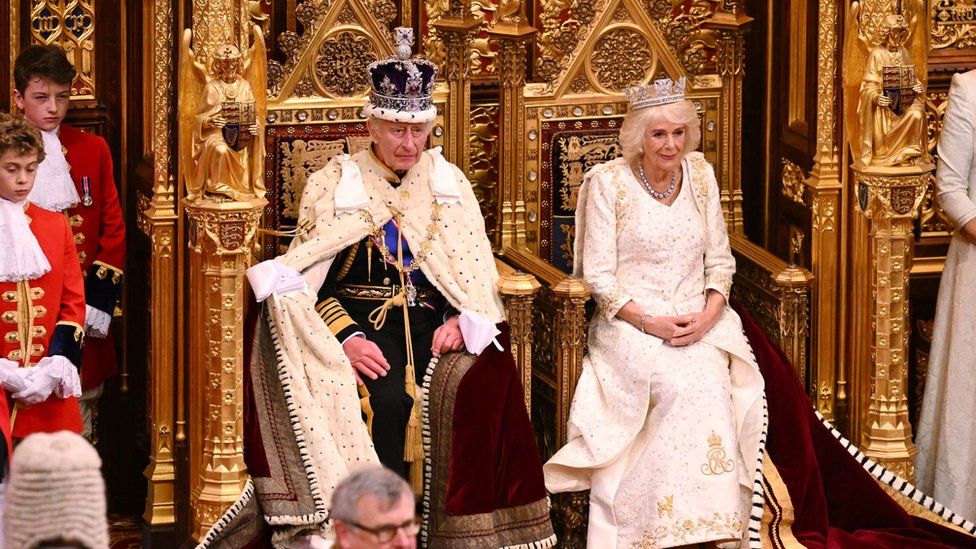
The prime minister said the speech was about “taking long-term decisions to build a brighter future for our country”.
Mr Sunak is seeking to present himself as a clear change from his predecessors, despite 13 years of a Conservative government, by highlighting measures including plans to phase out the sale of cigarettes in England.
However, Labour leader Sir Keir Starmer said the speech offered only “sticking plasters” and was “a plan for more of the same”.
He added that it offered “no change” on public services or the cost-of-living crisis.
There were also attempts to set political traps for Labour.
For example, a new bill would force ministers to run an oil and gas licensing round every year – something which normally happens anyway.
Reading the speech, the King, who has previously championed environmental issues, said the measure would help the country transition to net zero by 2050 “without adding undue burdens on households”.
Labour has said it would honour existing licenses for projects granted before the next general election, but would not allow any new ones if it won power.
Any vote on the bill could be tricky for Labour, which has seen internal divisions over the issue.
With little time to pass new legislation ahead of the next general election, around a third of the 20 or so bills have been carried over from last year’s parliamentary session or previously published in some form.
Lib Dem leader Sir Ed Davey accused the government of being “out of touch and out of ideas”, saying the speech failed to address issues including the cost of living, the NHS and sewage pollution.
SNP Westminster leader Stephen Flynn said the government had not taken steps which he said could increase economic growth, including more migration.
Some previous pledges have also been watered down.
The speech included a promise to make it cheaper and easier for leaseholders to purchase their freehold and to tackle the “exploitation of millions of homeowners through punitive service charges”.
But the bill would only ban leaseholds in England and Wales for new houses, not flats – which make up around 70% of leasehold homes.
Housing Secretary Michael Gove had previously promised to scrap the leasehold system, which means some homeowners must pay expensive maintenance charges and ground rent.
Meanwhile, the Renters Reform Bill, which includes a long-promised ban on “no-fault evictions” in England will continue its journey through Parliament.
However, the government has said the ban will only come into force after the court system is reformed.
A proposal from Home Secretary Suella Braverman to restrict the use of tents by rough sleepers in England and Wales was not included in the speech.
However, a source close to Mrs Braverman insisted it had not been dropped, despite a backlash from homelessness charities, opposition parties and some Tories.
